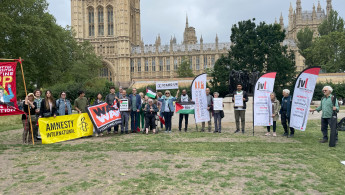After Scotland, Wales must reject UK 'anti-BDS' bill, activists say
Grassroots campaigners in Wales are writing to members of their parliament to urge them to oppose the UK government’s so-called ‘anti-boycott bill’, which seeks to place legal obstacles preventing public bodies from supporting the Palestinian-led Boycott Divestment and Sanctions (BDS) movement.
The action follows the Scottish government's announcement earlier this week opposing the proposed law known as the Economic Activity of Public Bodies (Overseas Matters) bill.
Campaigners from the Palestine Solidarity Campaign (PSC) argue that the bill would take away the right of local authorities, universities, pension funds and national governments to make ethical choices about spending and investments, effectively proscribing boycotts of states that violate human rights and break international law.
The only exception would be when such action is officially sanctioned by the government in London, concentrating the power to take foreign policy stances to a few ministers.
However, the bill names "Israel, the Occupied Palestinian Territories or the Occupied Golan Heights" as areas that can never be exempted from this protection against boycotts, divestment and sanctions.
The bill is currently on its way to becoming UK law. This would not necessarily be binding on the devolved national administrations of Scotland, Wales and Northern Ireland, but the bill's author, Michael Gove, has said he wants UK foreign policy to speak with "one voice".
The call from campaigners is for devolved national administrations to reject the bill, which they say not only gives a serial violator of international law like Israel unique protection from ethical BDS actions, but also attacks freedom of speech and conscience.
The Scottish precedent
On Wednesday, Scotland's Scottish National Party-led administration issued a Legislative Consent Memorandum (LCM), also known in Scotland as a Sewell motion, opposing the anti-boycott bill.
An LCM is a mechanism whereby devolved administrations, namely the Scottish Parliament, Welsh Senedd and Northern Ireland Assembly, can block the UK government from passing legislation on an area over which the devolved government has legislative authority.
The Scottish government’s case against the bill is simple, namely that it would illegally override devolved authorities in Scotland.
However, in outlining their case, the Scottish government make it clear that they disagree with the central premise of the bill that Israel should be given unique status among all states.
Addressing this matter, it wrote: "The effect of this … is that Israel is placed in a unique position amongst all other countries in the world – no matter what action it may take, the UK Government would be unable to act swiftly by secondary legislation to permit public bodies to take that action into account in relevant decisions."
The apartheid analogy
The Scottish government’s statement to the press also outlines the dangers of such a bill by comparing it to the UK government’s historic support for apartheid South Africa.
"The UK Government’s approach to apartheid government in South Africa, refusing to condemn it when others were actively boycotting it, demonstrates the danger inherent in this restriction," the statement read.
"We are rightly proud of those in Scotland who took a stand against apartheid. Under the provisions of this Bill, many of them would have been silenced," it concluded.
The hope for activists is that this creates a domino effect, where the lack of support for the bill in Scotland and potentially Wales would lead to it being scrapped or heavily amended by the Lords in the UK parliament. Alternatively, BDS activity could find a safe haven in the UK's Celtic nations.
So far, no representative of the Welsh government has responded to the bill.





 Follow the Middle East's top stories in English at The New Arab on Google News
Follow the Middle East's top stories in English at The New Arab on Google News


